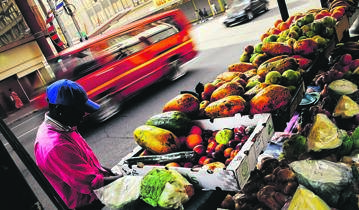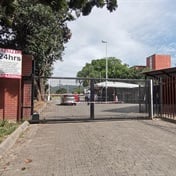
With lockdown in full effect, large supermarkets have continued to operate as an essential service. Meanwhile, small farmers and vendors face harassment and confusion from authorities over whether they can still trade their goods. It’s been financially devastating, but is also affecting poor communities that now don’t have access to any nutritional food, writes Anna Trapido
In his update on the Covid-19 coronavirus lockdown on March 30, President Cyril Ramaphosa said: “This is uncharted territory for us all. We have not experienced a situation like this before and a number of mistakes will be made, but we ask for our people’s understanding that all this is being done for the good of everyone, and we will continue to correct the mistakes wherever they are made.”
In the spirit of constructive criticism, let us look at the ways in which the current application of lockdown regulations are unnecessarily damaging South Africa’s small and informal food providers and the communities they serve.
The food industry is defined as an essential service, yet self-employed people whose livelihoods depend on the growing and distribution of food are not being adequately recognised as such.
The damage to the business of food provision cannot be deferred because doing so will compromise the nutritional status of many South Africans, which will lead to a reduction in their capacity to fight infection.
Small food producers and vendors can and should be central to the fight against Covid-19, but a report by the University of the Western Cape’s Institute for Poverty, Land and Agrarian Studies (Plaas) sets out the ways in which the implementation of lockdown regulations is preventing them from operating effectively.
Government has shown a willingness to modify and clarify regulations, but the reality on the ground is that, even when the small farmers, fishers and vendors are within their rights to trade, they face widespread confusion, inconsistency and harassment on the part of law enforcement authorities.
In the hands of the few
This has caused emergency food provision to be concentrated around a few corporate supply chains dominated by a handful of vertically integrated agribusinesses and supermarkets.
This has had an immediate impact on what poorer South Africans are buying and eating.
Evidence from the first week of lockdown set out in a report by the Pietermaritzburg Economic Justice & Dignity Group suggests a dramatic decline in consumption of fresh fruit, vegetables and meat.
Food buying patterns have changed, with consumers opting to purchase only staple carbohydrates and nonperishables sourced from a single supermarket rather than shopping around for the best deal at a range of smaller township traders.
While the supply chains of big agriculture into supermarkets are being respected as essential within the application of lockdown regulations, the grower pushing a wheelbarrow of spinach from a Tembisa food garden to a spaza shop and the man selling fish caught by coastal communities from the back of a bakkie on the Cape Flats are being thwarted in their attempts to supply nutritious and affordable food to needy people.
Clearly farmers and vendors cannot trade as before.
There is a need to deconcentrate the food system spatially, but this does not have to prevent informal street traders from buying and selling produce safely.
The Plaas report reads: “Since traditional selling areas like taxi ranks, and bus and railway stations now lie still, new sites can be quickly set up using existing public infrastructure. School premises that have been closed offer shelter, water and sufficient space for social distancing to be safely practiced. Government should immediately make such spaces available for food vendors to trade from.”
Vital solutions
The ideal situation is one that allows goods to circulate at a local level to ensure that the poor have sufficient access to food during the lockdown and that small producers are able to continue to safely sell their goods.
Nonprofit organisation African Spirit provides an example of how a community can create a win-win solution.
Shiyabazali is an informal settlement above Howick Falls in KwaZulu-Natal. The community is vulnerable, with many relying on casual daily labour for income.
The lockdown has made an already dire situation even worse.
African Spirit has established a sponsorship scheme where affluent Howick Falls residents donate money for vegetable boxes that are supplied and delivered to Shiyabazali by local grocer, Touchwood Veggies.
Touchwood sources its produce from small local farmers.
This initiative is not only helping small businesses to keep going during the lockdown, but also provides vulnerable people with good quality, fresh and nutritious food.
The tragic truth is that the pandemic is already resulting in a massive contraction in our economy.
Much of this contraction is unavoidable if we are to save lives.
However, the destruction of township food systems is not inevitable – we need to act now to shape the recovery in ways that will maximise the virtuous circular economy of these small producers.
. Want to help African Spirit in Shiyabazali? Contact Tshidiso Masopha on 078 828 9380 or facebook.com/africanspirithowick/
. In the Western Cape, Food Flow commissions small farmers to provide fresh food to families in communities whose children normally rely on school feeding schemes: foodflowza.com
. Studio-H continually updates a nationwide list of independent food businesses operating during lockdown: studio-h.co.za
Every Monday at 4.30pm, Studio-H also hosts G.URL GANG MONDAYS live podcasts to help women in the food industry with current Covid-19 issues. Follow them @fxxd_xx
. Johannesburg NOSH Food Rescue has joined forces with the team at Thava Indian Restaurant in Norwood for the Cooking With Compassion project. What was the restaurant space has been registered as an essential service site and nine chefs are cooking up a “plat du jour” from the NOSH-sourced supplies. NOSH will then distribute the meals to needy families in Alexandra township. To donate money or ingredients, go to noshfoodrescue.co.za/donate/
. Abalimi Bezekhaya has been supporting small-scale urban farmers in the Western Cape for more than 30 years. In response to the Covid-19 crisis, it is organising planting season manure runs that will take place daily for the next six weeks. Just R100 is enough to sponsor manure and seeds for one farmer to plant or re-plant 100m2 of garden area. R5 000 will cover the full cost of one manure run, which will reach 50 micro-farmers per day. Go to abalimibezekhaya.org.za
. In Orange Farm, Gauteng, The Ubuntu Project is working in collaboration with Our Social Kitchen and Green Business College to distribute seeds, seedlings, compost and gardening magazines to hundreds of needy families. Donations can be made at http://oursocialkitchen.co.za
TALK TO US
How should government go about ensuring communities can continue to buy nutritious food from smaller food traders?
SMS us on 35697 using the keyword FOOD and tell us what you think. Please include your name and province. SMSes cost R1.50. By participating, you agree to receive occasional marketing material
 | ||||||||||||||||||||||||||
Get in touchCity Press | ||||||||||||||||||||||||||
| ||||||||||||||||||||||||||
| Rise above the clutter | Choose your news | City Press in your inbox | ||||||||||||||||||||||||||
| City Press is an agenda-setting South African news brand that publishes across platforms. Its flagship print edition is distributed on a Sunday. |




 Publications
Publications
 Partners
Partners








